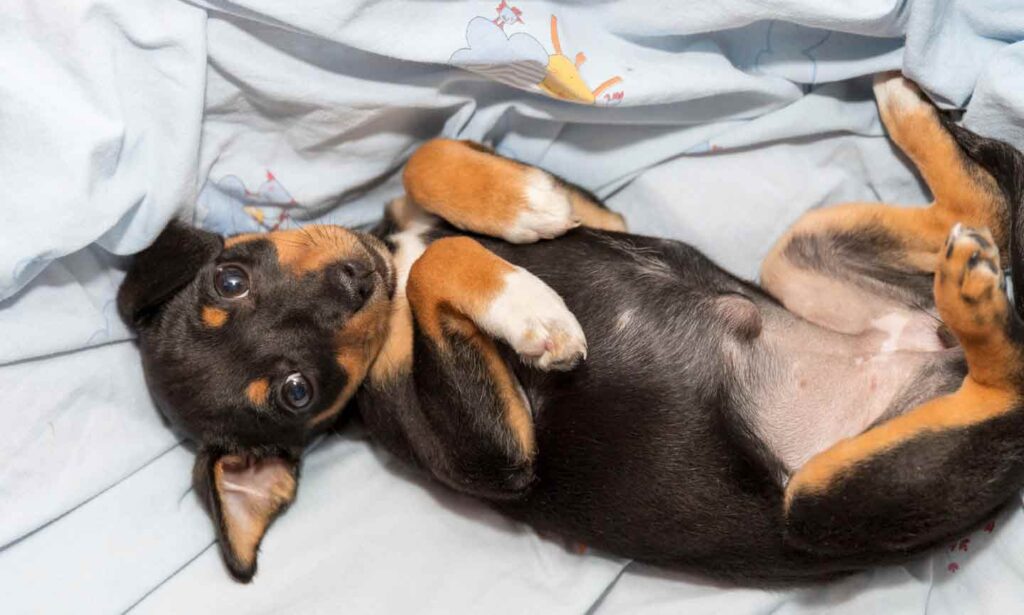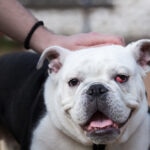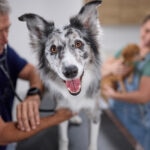Umbilical Hernias In Dogs: Everything You Need to Know

Photo by iStock.com/Tigrom
Did you know that dogs have belly buttons? It’s true—they’re just not normally as obvious to spot as ours are. If your puppy or adult dog has what looks to be an “outie,” they may have an umbilical hernia. Read on to learn all about this common, and usually relatively harmless, condition in dogs.
What Is an Umbilical Hernia?
In the womb, a puppy’s circulatory system interacts with their mom’s blood supply through the umbilical cord and placenta. The puppy receives oxygen and nutrients and eliminates carbon dioxide and waste through the blood vessels that run through the umbilical cord between the placenta and the puppy’s body.
When the puppy is born, the umbilical cord breaks (usually because the mom chews it off), leaving behind an umbilical stump. Over a few days, the structures within the stump break down, and the stump withers and falls off, leaving behind a flat belly button. During this time, the hole in the abdominal wall through which the umbilical blood vessels used to pass also starts to shrink and eventually closes completely—or at least this is what’s supposed to happen.
A puppy has an umbilical hernia when they still have a hole in their abdominal wall after the umbilical stump has fallen off and all the surrounding tissues have healed. If the hole is large enough, abdominal contents (usually just a little fat) can push through, creating a lump.
What Causes an Umbilical Hernia?
Umbilical hernias in dogs are relatively common and tend to occur in certain family lines. This means that a dog’s genetics, at least in part, determines whether they are likely to have an umbilical hernia. The exact genetics behind the trait aren’t fully understood, but some experts think that several genes may be involved, many of which are passed on in a recessive manner. If this is true, it has two important implications:
- Dogs who don’t have an umbilical hernia themselves may still pass the trait on to some of their puppies.
- Two dogs with the trait shouldn’t be bred to each other because all of the puppies could have umbilical hernias.
Unlike many other genetic conditions, the American Kennel Club doesn’t have strict recommendations against breeding dogs who have small umbilical hernias. Reputable breeders will not breed a dog who has a very large umbilical hernia and will avoid breeding two dogs with umbilical hernias together, even if the hernias are small. But other than this, the condition doesn’t have to affect their breeding decisions.
Umbilical hernias are usually harmless, but prospective pet parents who are concerned about the condition should only purchase puppies from breeders who perform all the breed-specific health screenings recommended by the Canine Health Information Center and ask about the incidence of umbilical hernias in their dogs. Find out more questions to ask your dog’s breeder.
It’s also possible for trauma to lead to an umbilical hernia. If the puppy’s umbilical cord is removed too aggressively, it can create an opening in the body wall that leaves behind a hole when it heals. This doesn’t happen very often, however. Be wary if a breeder claims that the reason behind most of the puppies in a litter having umbilical hernias is their mother chewing off their umbilical cords too aggressively. This probably isn’t the case.
Signs Your Dog Has an Umbilical Hernia
Umbilical hernias in dogs aren’t hard to identify. Look for these qualities:
- Location: You can find the umbilicus (belly button) on the midline of a dog’s belly, just below the rib cage.
- A lump: With a small umbilical hernia, a little soft fat is all that normally moves through the hole in the body wall. Small umbilical hernias are usually only about 1/2 of an inch wide. When a dog has a large umbilical hernia, abdominal organs like loops of intestines may be able to pass through.
With some hernias, it’s possible for a veterinarian to push the fat or other abdominal contents that have moved through the hernia back into a dog’s abdomen. These hernias are said to be “reducible.” Hernias that are easily reducible are unlikely to cause a dog serious problems, even if they are large.
With other hernias, fat or abdominal organs will get stuck in the opening of the body wall. Scar material may also form, which will make it impossible to push everything back into the abdominal cavity. This is a non-reducible hernia.
Are Umbilical Hernias Dangerous?
Umbilical hernias in dogs are mostly a cosmetic issue. Most of them pose little threat to dog health and aren’t painful for your dog. But there are two possible risks:
- Strangulation: When a dog has a large abdominal hernia, it is possible for the abdominal contents that have passed through to twist or become pinched, which can block off their blood supply. This is a medical emergency called strangulation, and it is very painful. Thankfully, strangulations are extremely rare—most veterinarians never see a case over their entire careers.
- Trauma to the Skin: Because hernias form a protrusion away from the body wall, it is also possible for the skin over them to become damaged after dragging against rough or irritating surfaces.
Make an appointment with your veterinarian if you have any questions about umbilical hernias and your dog. They can usually tell you if your dog has a hernia after performing a physical examination and then can discuss treatment options with you.
Treatment for Umbilical Hernias in Dogs
Some dogs with umbilical hernias don’t require any treatment at all. If the hernia is small and it doesn’t bother you or your dog, there is no harm in just letting it be. This is especially true if your dog is very young. Small umbilical hernias may close on their own until a puppy is 3 to 4 months of age.
On the other hand, large hernias should be repaired because they are unsightly, probably at least a little annoying to the dog, and because, even though the risk is small, strangulation of abdominal contents is potentially life-threatening.
Oftentimes, veterinarians will recommend surgery to repair an umbilical hernia when a dog is going to be anesthetized for other reasons, such as spaying or neutering. The surgery involves pushing the fat or other tissues back into the abdominal cavity, then using strong sutures to pull the edges of the umbilical ring (aka the opening in your dog’s stomach) together to heal. For large hernias, mesh may be placed over the hole instead of drawing the umbilical ring together.
After an umbilical hernia repair, it’s important that a dog not be able to lick or chew at their incision. If they do, they may remove their sutures and need another hernia surgery to repair the damage. E-collars, bandages, surgery recovery suits, or onesies can all be used to keep dogs from damaging their incisions. Make sure you give your dog any post-op medications that your veterinarian has prescribed, follow their directions regarding activity restriction and other lifestyle modifications, and return for any follow-up appointments they recommend.
What does this all mean for you? If you already have a dog with a small umbilical hernia, the choice to have it repaired is all yours. The surgery isn’t difficult to recover from, but choosing not to go forward with a hernia repair won’t put your dog’s health at risk either. Large umbilical hernias do need treatment, but even these surgeries can usually wait until a puppy is a little older and is scheduled to be spayed or neutered.
Considering umbilical hernia repair for your pup? Find out how to calm a dog after surgery.



